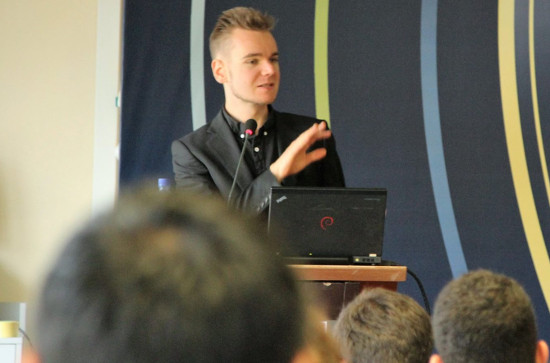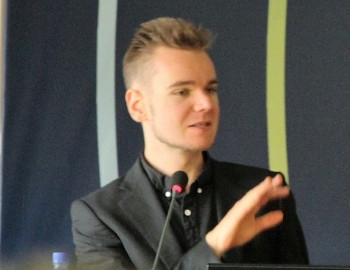In his first interview since assuming leadership of what is possibly the largest community free software project worldwide — the Linux kernel project comes close — Lamb, a man who like many nerds is economical with words, said he also wanted to have more face-to-face meetings with current developers.
In the 2017 election, the first time he has run for office, Lamb defeated the incumbent DPL, Mehdi Dogguy.
At 31, Lamb is a freelance developer based in London, and has been with Debian for a decade, having officially become a developer in September 2008.
|
|
Aside from maintaining a number of packages, Lamb has written plenty of Debian-specific software such as AptFS, debian-bts-applet & travis.debian.net. He was the original author of the #debian-devel-changes IRC bot and the Debian Timeline.
He also works on the Debian Long Term Support (LTS) project and produces a monthly report outlining his contributions to free software. And if all this were not enough, Lamb also maintains plenty of non-Debian software.
Lamb was interviewed by email.
iTWire: What led you to stand for election?
Chris Lamb: The DPL position was always something I had held in high regard and held by such a long list of influential and respected personalities that it wasn't "for me", especially as I typically do not seek out public accolades.
However, since the beginning of 2017 I started to reframe the position as another way of contributing to Debian as well as an opportunity for personal growth for myself: the challenges faced by the DPL are unlikely to be solved with code — my usual hammer as it were — but rather by diplomacy and other soft skills.

Chris Lamb: "I am not expending effort in wondering whether I would run again."
First let me put to you the questions you raised in your manifesto: Is Debian still relevant? Is it lacking focus? What does it stand for?
Debian is absolutely still relevant! Our upcoming release will certainly be our best yet and an achievement we should be truly proud of. Due to our large and varied derivatives we are also still uniquely placed to improve the free software ecosystem as a whole with still a huge amount of potential for growth and innovation.
In terms of what we stand for, that remains nebulous. Indeed, I am sure this is what attracts people to the project; the somewhat "jack of all trades" nature of the Project makes it incredibly flexible and welcoming for people's contributions.
A laser-focused Debian would be a retrograde step both for our developers but moreover for our users who might object to that particular focus, or even fear the chosen focus being altered underneath them.
Every Debian leader I have interviewed has talked about improving communication within the project. So have all their words been just talk given that you found it one of the most important things to highlight in your election platform?
First, I would not wish to belittle former DPLs efforts' with regards to improving communication, especially as I know that many have done an excellent job at improving it given the constraints placed upon them.
The reality is that this is not an issue that can be "solved" by the DPL in any sense of the word, merely improved over the current status quo. However, focusing on solutions that might return noticeable results over Sisyphean attempts to, say, improve online civility and discourse as a whole (!) would seem to suit the role far better.
Perception is a word that can be interpreted in many ways. Would you like Debian to be more media-friendly so that more people come to know of it rather than just an eclectic crowd?
Absolutely. Whilst I seriously doubt that many people are contributing to Debian for public recognition, becoming more media friendly would certainly aid the project reach many of our goals. We are doing ourselves, our users and potential future developers a disservice by neglecting (or deliberately avoiding) the most basic of marketing in places.
How about social media? I am subscribed to the Debian Twitter feed but the number of tweets that emerge is very tiny. Do you think social media promotion is a good way to popularise Debian?
Having a social media presence is now a "hygiene factor", ie. something you simply expect of an organisation and are suspicious when it is absent, thus having one is essentially unavoidable in 2017.
Whether it is a good or effective way of popularising Debian remains to be seen; I don't believe we have truly significant crossover in Twitter usage and our current users & developers in terms of philosophy and outlook, but this could simply be selection bias at play. In other words, by implying "our users don't use Twitter" is self-reinforcing.
Perhaps we should change that and reach out to these other groups.
When you talked about organising more meetings in your election platform, do you only mean physical meetings or online ones too?
Physical meetings. (In his election platform Lamb wrote: "More importantly, we criminally undervalue the longer-term halo effects of such meetups as they act as a social lubricant for subsequent online communications that can go awry. I would not only help encourage and assist in the organisation of new events, I would look to grow the number and diversity of people attending existing meet-ups wherever possible.")
It has always been difficult for someone new to join Debian as a maintainer. So what ideas do you have on this front?
You are right to imply that the New Maintainer (NM) process has been difficult to navigate in the past. However, I've seen a lot of work been done on the NM process in the last 18 months to and have nothing but respect for the Team for that. If anyone has been put off joining because of this perception, please do re-evaluate the current situation.
Will the outreach initiative you talked about in your platform cater only to women? Or will it cover people of both sexes?
This remains an open question. It may make sense for various reasons, but in an ideal world I believe we would be highlighting that we would be prioritising seeking applicants with diverse opinions and cultures over more humdrum properties of their identity.
Debian has only just devised a means to implement secure boot for the distribution which I presume will be released with Stretch. Fedora and openSUSE came out with secure boot-supported releases a long time back, soon after Microsoft introduced it in October 2012. What's the point of this now, after the golden key to secure boot was leaked?
I'm afraid I'm extremely ignorant on Secure Boot issues so I would prefer not to comment. Stretch (the forthcoming release) will support it, however.
How is Debian's relationship with Ubuntu at the moment?
I don't believe the situation has changed much in the past 12 months; I continue to see many contributions coming "back" from Ubuntu as well as changes in Debian explicitly to help Ubuntu. However, the recent changes with respect to Unity and staffing may affect this, but that remains to be seen and is not something that Debian could reasonably influence.
Have any Debian developers that you know of expressed an interest in forking the Ubuntu Phone distribution and making a go of it?
Not that I am aware of, no.
Finally, are your plans for Debian implementable (ah, that's a made-up word!) in one year or will you be back to run again in 2018?
I would certainly hope so. I am not expending effort in wondering whether I would run again.
The writer has used Debian's x86, AMD64 and mips ports over the last 17 years.









































